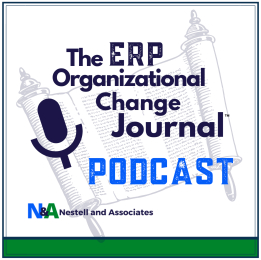The absence of significant challenges is certainly not a precursor to ERP organizational change success.
Navigating ERP Orgamnizational Change Challenges
Naturally inherent in ERP organizational change (and nearly by definition) exist challenges, disruption, risks, and the unexpected (Learn more about the post go-live productivity dip here). However, the absence of significant challenges is certainly not a precursor to ERP organizational change success. That is, while crucial, success is not only about deploying mechanisms and best practices to prevent and counter risk and challenges proactively. Success is also about how organizations respond to risks and challenges when they do occur. Success is not just about prevention, success is also about response.
Research and anecdotal evidence suggest that even successful ERP organizational change efforts can be quite challenging “along the way”. Clearly, there are successful projects, there are projects that struggle but endure, there are projects that struggle significantly but endure, and there are cases of complete failure. However, even successful ERP organizational change projects often take on significant challenges and risks. As ERP organizational change practitioners, ERP vendors, and ERP VARs (value-added resellers), it is known unequivocally that ERP organizational change can present significant and often “unexpected” challenges.
The evidence clearly suggests that often significant challenges are inherent in ERP organizational change. And the key is to be honest about the true realities and expectations from the onset of such an endeavor. It is not only about the precise and effective ability to prevent problems in the first place, it is also about how organizations are prepared and then respond to challenges when they do occur. (And, organizational culture has a great deal to do with how organizations respond.)
The Disruptive Impact of ERP Organizational Change
ERP Organizational Change Can Be Highly Disruptive. ERP systems fundamentally alter how businesses operate, often leading to significant but necessary disruptions. The following insights from various studies highlight the depth and nature of these disruptions:
- “The integrated nature of ERP applications causes dramatic changes on workflow, organizational structure and on the way people do their jobs…ERP systems are not built but adopted, this involves a mix of business process re-engineering (BPR) and package customization…ERP implementation is not just a technical exercise but it is a socio-technical challenge as it poses a new set of management procedures.” (Sawah, Tharwat & Rasmy, 2013).
- Stratman and Roth (2018) note that “anecdotal accounts indicate that the realization of ERP’s potential benefits is rare.”
- “If case studies are any indication of the outcomes in ERP investment, insights already suggest that many attempts have not delivered the expected benefits, have failed completely, or will have a high probability of failure.” (Shao, Feng, & Hu, 2017)
- “The implementation of such systems is a complex process..” (El-Sobky & Hadi, 2015)
- “Installation takes between one and three years (21 months on average), with benefits starting to accrue in an average of 31 months [30, 36]. Part of this difficulty is due to the pervasiveness of the changes associated with ERP, the need for simultaneous process redesign of multiple functional areas within the firm, and the need to adapt processes to the capabilities of the software. There is also a high degree of managerial complexity of these projects” (Hitt, Wu, & Zhou, 2014)
- “However, despite the promise of a high operational and strategic impact (if a sound business process analysis is performed), it remains challenging to easily familiarize with the use of ERPs (in order to manage computerized data exchanges) and to integrate software packages within them”. (Wamba, Kamdjoug, Akter, & Carillo, 2018)
These passages highlight the multifaceted nature of challenges encountered in ERP implementation. From protracted deployment periods to necessary adjustments in business processes, and significant managerial hurdles, it becomes evident that navigating the journey to harness ERP’s potential is laden with hurdles. Grasping these complexities is essential for any enterprise undertaking an ERP transformation.

Organizations are successful due to how they approach, address, and respond to potentially significant issues.
Key Elements of ERP Organizational Change Success
Prevention and Response:
- ERP organizational change is a significant endeavor for even “successful” companies. But the complete elimination and/or absence of significant and substantial challenges are certainly not a precursor to success. This is perhaps because preventing significant and substantial challenges is often nearly impossible. Sound, objective, and vendor-neutral research and evidence-based inquiry suggest that success comes not just from the ability to prevent challenges.
- Organizations that realize great progress and success are those that do not rely solely on prevention. They are successful because they know how to effectively respond to challenges.
Cultural and Organizational Factors:
- Success is also determined by other factors and influences that dictate how organizations approach, address, and respond to significant issues. These include promoting teamwork, advocating for effective risk management, endorsing healthy conflict, and championing a proper transformational corporate culture.
Implementation and Adaptation:
- The ERP organizational change project plan needs to include mechanisms that teach the honest realities and expectations inherent in ERP organizational change. This includes promoting teamwork and advocating for effective risk management.
- Implementation methodologies and tactical project plans should advocate not only for the prevention of challenges and mitigation of risks but also for how organizations may respond to challenges when they do occur. This approach is largely driven by organizational culture and the “people” component of the ERP organizational change triad of people, processes, and technology.
Summary on Success:
- Success in ERP organizational change is not just about prevention; it is equally about how to respond. The strategic response to challenges plays a critical role in navigating the complexities of ERP implementation.
In conclusion, ERP organizational change is a complex yet rewarding journey. While there may be significant challenges, the true measure of success lies not merely in preventing these issues but in how an organization responds and adapts to them. By fostering a culture that embraces teamwork, effective risk management, and evidence-based strategies, changecan be navigated more effectively. Remember, the ultimate success in ERP implementation is achieved through a balanced focus on both proactive prevention and strategic response. Let us move forward with the understanding that our approach to these challenges defines our path to success.
Dr. Jack G. Nestell
Ready for a Disruptive Organizational Change endeavor?
At Nestell & Associates, we provide consultation services to support companies through all the inherent levels of organizational change that come from combining diverse cultures, people, and processes. Our team of experts can provide the necessary guidance and resources required to develop organizational assessments and communication strategies that help guide employees, partners, and customers through organizational change.
References
Hitt, Wu, & Zhou (2014). “Investment in Enterprise Resource Planning: Business Impact and Productivity Measures.” https://www.tandfonline.com/doi/abs/10.1080/07421222.2002.11045716
Shao, Feng, & Hu (2017). “Impact of top management leadership styles on ERP assimilation and the role of organizational learning.” Information & Management 54(7): 902-919.
El Sawah, Tharwat & Rasmy (2013). “A quantitative model to predict the Egyptian ERP implementation success index.”
Stratman & Roth (2018). “Enterprise Resource Planning (ERP) Competence Constructs: Two‐Stage Multi‐Item Scale Development and Validation* – Stratman – 2002 – Decision Sciences – Wiley Online Library.”
Wamba, Kamdjoug, Akter, and Carillo (2018). ERP Adoption and Use in Production Research: An Archival Analysis and Future Research Directions. Conference on e-Business, e-Services and e-Society, Springer.
The ERP Organizational Change Journal – Podcast
We share smart ERP solutions and success stories, and promote organizational change and digital transformation success through industry trends and dedicated ERP professionals.
About Nestell & Associates
Where People, Processes, and Technology Align
Nestell & Associates specializes in providing M&A ERP and IT consulting services for private equity firms and their portfolio companies. We offer a range of vendor-neutral services to support all stages of the investment cycle.
Moreover, we know how to effectively minimize or eliminate the issues you experience during M&A. With Private Equity Technology Solutions as 100% of our business, we bring a unique approach to ERP that other firms can’t compete with.


